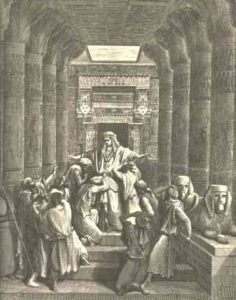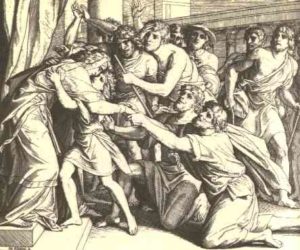Outline
Joseph comforts his brethren, and sends for his father. (Verse 1-15.)
Pharaoh confirms Joseph’s invitation, Joseph’s gifts to his brethren. (Verse 16-24.)
Jacob receives the news of Joseph’s being alive. (Verse 25-28.)
1 Then Joseph could not refrain himself before all them that stood by him; and he cried, Cause every man to go out from me. And there stood no man with him, while Joseph made himself known unto his brethren.
He shortened the time he was planning on making his brothers suffer just like Jesus does during the time of Jacob’s trouble.
Matthew 24:22 For then shall be great tribulation, such as was not since the beginning of the world to this time, no, nor ever shall be. 22 And except those days should be shortened, there should no flesh be saved: but for the elect’s sake those days shall be shortened.
2 And he wept aloud: and the Egyptians and the house of Pharaoh heard.
3 And Joseph said unto his brethren, I am Joseph; doth my father yet live? And his brethren could not answer him; for they were troubled at his presence.
Joseph’s revealing of himself to his brethren is a picture of when Christ will reveal himself to his brethren (the Jews) at his second coming; note that Joseph only revealed himself to his brethren, just as (spiritually speaking) Christ only reveals himself to those who belong to him.
4 And Joseph said unto his brethren, Come near to me, I pray you. And they came near. And he said, I am Joseph your brother, whom ye sold into Egypt.

5 Now therefore be not grieved, nor angry with yourselves, that ye sold me hither: for God did send me before you to preserve life.
in two verses [5,7], Joseph gives three reasons why God allowed the events to happen that did
6 For these two years hath the famine been in the land: and yet there are five years, in the which there shall neither be earing nor harvest.
7 And God sent me before you to preserve you a posterity in the earth, and to save your lives by a great deliverance.
Israel will again one day experience a great famine in their land as they are expelled back again into captivity in the wilderness for a period of three and one-half years during the latter half of the tribulation period.
Joseph reveals himself to his brethren the second time just as he will after the Tribulation Period. Stephen spoke about this in Acts 7:1-14
8 So now it was not you that sent me hither, but God: and he hath made me a father to Pharaoh, and lord of all his house, and a ruler throughout all the land of Egypt.
note Joseph’s heart attitude – rather than blaming his brothers, he makes it clear that God has been in charge all along.
9 Haste ye, and go up to my father, and say unto him, Thus saith thy son Joseph, God hath made me lord of all Egypt: come down unto me, tarry not:
10 And thou shalt dwell in the land of Goshen, and thou shalt be near unto me, thou, and thy children, and thy children’s children, and thy flocks, and thy herds, and all that thou hast:
11 And there will I nourish thee; for yet there are five years of famine; lest thou, and thy household, and all that thou hast, come to poverty.
12 And, behold, your eyes see, and the eyes of my brother Benjamin, that it is my mouth that speaketh unto you.
13 And ye shall tell my father of all my glory in Egypt, and of all that ye have seen; and ye shall haste and bring down my father hither.
14 And he fell upon his brother Benjamin’s neck, and wept; and Benjamin wept upon his neck.

15 Moreover he kissed all his brethren, and wept upon them: and after that his brethren talked with him.
[Gen 29:11, Gen 33:4, 1st Cor 16:20, 2nd Cor 13:12, 1st Peter 5:14]
16 And the fame thereof was heard in Pharaoh’s house, saying, Joseph’s brethren are come: and it pleased Pharaoh well, and his servants.
17 And Pharaoh said unto Joseph, Say unto thy brethren, This do ye; lade your beasts, and go, get you unto the land of Canaan;
18 And take your father and your households, and come unto me: and I will give you the good of the land of Egypt, and ye shall eat the fat of the land.
19 Now thou art commanded, this do ye; take you wagons out of the land of Egypt for your little ones, and for your wives, and bring your father, and come.
20 Also regard not your stuff; for the good of all the land of Egypt is yours.
21 And the children of Israel did so: and Joseph gave them wagons, according to the commandment of Pharaoh, and gave them provision for the way.
22 To all of them he gave each man changes of raiment; but to Benjamin he gave three hundred pieces of silver, and five changes of raiment.
[Gen 43:34]
23 And to his father he sent after this manner; ten asses laden with the good things of Egypt, and ten she asses laden with corn and bread and meat for his father by the way.
24 So he sent his brethren away, and they departed: and he said unto them, See that ye fall not out by the way.
25 And they went up out of Egypt, and came into the land of Canaan unto Jacob their father,
26 And told him, saying, Joseph is yet alive, and he is governor over all the land of Egypt. And Jacob’s heart fainted, for he believed them not.
Who would believe such a story? If it wasn’t for the wagons Jacob may have remained in the land until his death. God knows what he is doing in your life as well.
27 And they told him all the words of Joseph, which he had said unto them: and when he saw the wagons which Joseph had sent to carry him, the spirit of Jacob their father revived:
28 And Israel said, It is enough; Joseph my son is yet alive: I will go and see him before I die.
“Jacob their father revived: And Israel said….” – when following the flesh we find this man going by his old name, “Jacob”; when following the leading of God’s Spirit we find him going by his new name, “Israel” – compare 48:2 and 49:2.
What an impossibility Joseph would have thought only a few minutes earlier. The things that are impossible with man are possible with God.
Commentary by Matthew Henry, 1710.
Verse 1-15 – Joseph let Judah go on, and heard all he had to say. He found his brethren humbled for their sins, mindful of himself, for Judah had mentioned him twice in his speech, respectful to their father, and very tender of their brother Benjamin. Now they were ripe for the comfort he designed, by making himself known. Joseph ordered all his attendants to withdraw. Thus Christ makes himself and his loving-kindness known to his people, out of the sight and hearing of the world. Joseph shed tears of tenderness and strong affection, and with these threw off that austerity with which he had hitherto behaved toward his brethren. This represents the Divine compassion toward returning penitents. “I am Joseph, your brother.” This would humble them yet more for their sin in selling him, but would encourage them to hope for kind treatment. Thus, when Christ would convince Paul, he said, I am Jesus; and when he would comfort his disciples, he said, It is I, be not afraid. When Christ manifests himself to his people, he encourages them to draw near to him with a true heart. Joseph does so, and shows them, that whatever they thought to do against him, God had brought good out of it. Sinners must grieve and be angry with themselves for their sins, though God brings good out of it, for that is no thanks to them. The agreement between all this, and the case of a sinner, on Christ’s manifesting himself to his soul, is very striking. He does not, on this account, think sin a less, but a greater evil; and yet he is so armed against despair, as even to rejoice in what God hath wrought, while he trembles in thinking of the dangers and destruction from which he has escaped. Joseph promises to take care of his father and all the family. It is the duty of children, if the necessity of their parents at any time require it, to support and supply them to the utmost of their ability; this is showing piety at home, 1st Timothy 5:4. After Joseph had embraced Benjamin, he caressed them all, and then his brethren talked with him freely of all the affairs of their father’s house. After the tokens of true reconciliation with the Lord Jesus, sweet communion with him follows.
Verse 16-24 – Pharaoh was kind to Joseph, and to his relations for his sake. Egypt would make up the losses of their removal. Thus those for whom Christ intends his heavenly glory, ought not to regard the things of this world. The best of its enjoyments are but lumber; we cannot make sure of them while here, much less can we carry them away with us. Let us not set our eyes or hearts upon the world; there are better things for us in that blessed land, whither Christ, our Joseph, is gone to prepare a place. Joseph dismissed his brethren with a seasonable caution, “See that ye fall not out by the way.” He knew they were too apt to be quarrelsome; and having forgiven them all, he lays this charge upon them, not to upbraid one another. This command our Lord Jesus has given to us, that we love one another, and that whatever happens, or has happened, we fall not out. For we are brethren, we have all one Father. We are all guilty, and instead of quarrelling with one another, have reason to fall out with ourselves. We are, or hope to be, forgiven of God, whom we have all offended, and, therefore, should be ready to forgive one another. We are “by the way,” a way through the land of Egypt, where we have many eyes upon us, that seek advantage against us; a way that leads to the heavenly Canaan, where we hope to be for ever in perfect peace.
Verse 25-28 – To hear that Joseph is alive, is too good news to be true; Jacob faints, for he believes it not. We faint, because we do not believe. At length, Jacob is convinced of the truth. Jacob was old, and did not expect to live long. He says, Let my eyes be refreshed with this sight before they are closed, and then I need no more to make me happy in this world. Behold Jesus manifesting himself as a Brother and a Friend to those who once were his despisers, his enemies. He assures them of his love and the riches of his grace. He commands them to lay aside envy, anger, malice, and strife, and to live in peace with each other. He teaches them to give up the world for him and his fulness. He supplies all that is needful to bring them home to himself, that where he is they may be also. And though, when he at last sends for his people, they may for a time feel some doubts and fears, yet the thought of seeing his glory and of being with him, will enable them to say, It is enough, I am willing to die; and I go to see, and to be with the Beloved of my soul.
